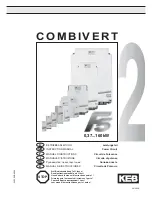
EN-4
pleted your work, always check that the area
is free of glowing or smoldering material.
2.5 SHIELDING GAS
Use the correct shielding gas for the welding
process. Be sure that the regulator/flowmeter
mounted on the cylinder is working well.
Remember to keep away the cylinder from
any source of heat.
2.6 PERMITTED NOISE LEVELS 86/188/
EEC RULE.
Under normal circumstances the equipment
used for electric arc welding does not exceed
the permitted 80 dBA. However in certain
conditions eg. high welding parameters in
confined spaces, noise levels may exceed
the permitted level. For this reason it is stron-
gly recommended that operatives wear ap-
propriate ear protection.
2.7 ELECTROMAGNETIC
COMPATIBILITY.
Before installing the STICK/TIG welding unit,
carry out an inspection of the surrounding
area, observing the following guidelines:
1- Make sure that there are no other power
supply cables, control lines, telephone leads
or other equipment near the unit.
2- Make sure that there are no radio recei-
vers or television appliances.
3- Make sure there are no computers or other
control systems.
4- Make sure that there is no-one with a pa-
cemaker or hearing aid in the area around
the unit.5- Check the immunity of any other
equipment operating in the same envi-
ronment.
In certain cases additional protective measu-
res may be required.
Interference can be reduced in the following
ways:
1- If there is interference in the power sup-
ply line, an E.M.C. filter should be inserted
between the mains and the unit.
2- The output cables of the unit should be
shortened; these should be kept close toge-
ther and stretched along the ground.
3- All the panels of the unit should be cor-
rectly closed after carrying out maintenance.
2.8 MEDICAL AND FIRST AID
TREATMENT
First aid facilities and a qualified first aid per
-
son should be available for each shift for im-
mediate treatment of electrical shock victims.
A medical facility should be close by for im-
mediate treatment of flash burns of the eye
and skin burns.
EMERGENCY FIRST AID:
Call physician and ambulance immedia-
tely.
Use First Aid techniques recommended
by The Red Cross.
DANGER: ELECTRIC SHOCK CAN BE
FATAL
If person is unconscious and electric
shock is suspected , do not touch the
person if he or she is in contact with wel-
ding equipment, or other live electrical
parts. Disconnect (open) power at wall
switch and then use First Aid. Dry wood,
wooden broom, or other insulating ma-
terial can be used to move cables, if ne-
cessary, away from the person.
Fig.10











































